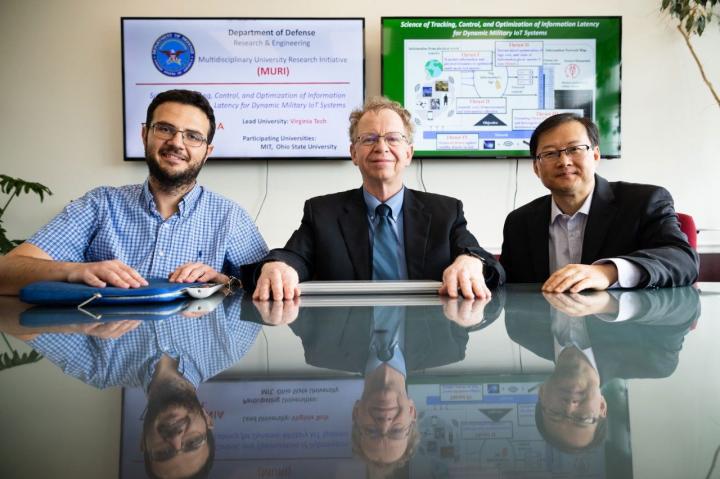
Credit: Virginia Tech
Information latency is a measure of how quickly or slowly networked devices transmit information. When the information being transmitted is for the military, understanding latency may be the deciding factor in the outcome of warfare.
That’s one of the reasons the U.S. Department of Defense has now tapped the expertise of an interdisciplinary research team led by Virginia Tech to study latency and information freshness in military Internet of Things systems with a $7.5 million, five-year Multidisciplinary University Research Initiative grant.
The goal is to develop a novel foundational framework for guaranteeing low latency and information freshness in military networked systems, such as the Internet of Things, using a cutting-edge concept known as multimode age of information, which tightly ties in information latency with the dynamic networked military system.
The project will fundamentally define this new concept of information latency and provide a suite of tools to optimize multimode age of information in massive-scale military networked systems.
“Despite much progress being made in the study of military communications, the basic science for tracking, control, and optimization of information latency is yet to be developed,” said principal investigator Jeffrey Reed, Willis G. Worcester Professor of Electrical and Computer Engineering in the College of Engineering at Virginia Tech. “In fact, a fundamental knowledge of information latency is crucial for our military to maintain information superiority on the battlefield.”
The project will involve fundamental research coupled with extensive experimental prototypes and demonstrations to validate the proposed novel framework in real-world domains critical to military services. By the grant’s end, the team will equip the Department of Defense with latency-centric innovations and foundational science of information latency broadly applicable across multiple military applications.
“This project addresses complex, multidisciplinary problems that are poised to have a significant impact on national security,” said Stefan Duma, director of the Institute of Critical Technology and Applied Science. “This project encompasses multiple areas that are of interest to ICTAS and we look forward to support the team and its successful execution of this project.”
The Department of Defense’s highly competitive Multidisciplinary University Research Initiative (MURI) grant program invites teams of researchers to submit research proposals on designated topics of high importance to the Department of Defense and military services. Each topic requires expertise from multiple scientific and technical disciplines.
“The challenges we face today are highly complex in nature and do not fall in line with a single discipline,” said Mitch Nikolich, director of the U.S. Department of Defense’s Defense Research and Engineering for Research and Technology. “MURIs acknowledge these complexities by supporting teams whose members have diverse sets of expertise as well as creative and different approaches to tackling problems. It’s a program that remains a cornerstone of the DOD’s legacy of scientific impact.”
From 295 proposals received, the Department of Defense selected 24 final research teams who each received a slice of the $162 million available.
The Virginia Tech-led team will receive $7.5 million over five years starting in 2019, with a three-year base period and two-year optional period. As the leading institution of the award, Virginia Tech’s portion is $5 million.
The team is borne out of a close collaboration among researchers in wireless networks, information theory, signal processing, game theory, optimization, learning, control theory, computer science, and cybersecurity.
The team consists of four Virginia Tech researchers from the College of Engineering — Reed, electrical and computer engineering faculty members Tom Hou and Walid Saad, and computer science faculty member Wenjing Lou — and faculty from two participating institutions: Lizhong Zheng of Massachusetts Institute of Technology and Atilla Eryilmaz of Ohio State University.
“The MURI award is one of the most competitive and a very prestigious Department of Defense award for academic research,” said Jack Lesko, associate dean of research and graduate studies of College of Engineering. “Being the lead institution of a winning MURI project is a testament of the highest quality of our faculty’s research in the College of Engineering and our focus on making an impact with our laboratory discoveries.”
###
Media Contact
Lindsey Haugh
[email protected]
Original Source
https:/




